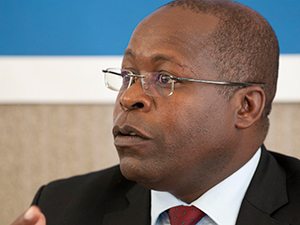
[miningmx.com] – THE South African platinum industry had been too slow to cut production and control supply, said Lonmin CEO, Ben Magara.
In an interview at Lonmin’s Johannesburg premises on Friday, Magara also said that Lonmin had committed its own mistakes in the past. There had been some $2bn in misallocated capital which was spent on mechanisation and the $1bn Akanani project that was not developed, he said.
“One has to accept that Lonmin, nor the industry, have always done it well,” said Magara. “If you look at the industry now, we could have done more to address supply. Low [PGM] prices will drive us to produce less anyway,” he said.
“Ten years ago, when the boom was on – everyone in the industry thought it would never end. Lonmin, for instance, bought Akanani in the Limpopo province for $800m to $1bn. Just farms although with high grade platinum beneath.
“The second thing is that Lonmin went into mechanisation and hoped that would turn the world around; that was another $1bn mechanising deep, narrow, tabular, and hot orebodies, so mechanisation could not work.
“It then spent $500m to reverse mechanisation back to labour intensive mining. By 2012, Lonmin had turned the corner with readily available ore reserves,” he said adding that unfortunately the group was then hit by the five month strike in 2014.
Magara was commenting five days before a crucial meeting in which shareholders will decide whether to proceed with a $408m rights offer that will see enormous dilution in the share, but give the company more breathing space to repay its debt.
He declined to comment on the prospects of shareholders approving the rights issue, but he made the point that they could approve the offer without following their rights.
Magara said he had spoken to all of the firm’s top 10 shareholders which represent about 50% of the total shares in issue. Some 75% of shareholders voting are required to approve the offer.
“Shareholders can vote for rights issue, but not follow their rights and would still have something,” he said.
“It is not in their interests to hand it back to the banks and there’s no guarantee that [Lonmin] going into business rescue would remove ounces from the market.”
Magara also addressed speculation that the Public Investment Corporation (PIC), the state-owned asset management firm, was re-thinking its earlier decision to follow its rights in Lonmin’s fund-raiser.
Asked if the PIC would still vote in terms of its 7% stake in Lonmin, Magara gave a resounding “Yes”. He said the PIC was “a deep and a long-term investor”.
The PIC had offered to sub-underwrite the rights issue (Lonmin’s 10 lenders are the main under-writers), but they would not end up controlling Lonmin, said Magara.









